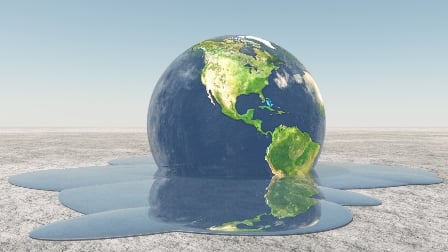A professor from the University of Alberta believes that while climate change did not cause the rash of wildfires that recently broke out in Alberta and BC, it did make them much worse.
Recent wildfire incidents that have plagued the country not only caused considerable and costly damages, but were also easily stoked, University of Alberta professor of wildland fire Mike Flannigan observed.
Don’t miss our exclusive CE webinar, Climate Change in Insurance: How to Sell Catastrophic Coverage
The fire that spread across BC in early April was the province’s worst ever wildfire season, with over 12,000 square kilometers of timber, bush and grassland torched down to the ground, and 45,000 residents evacuated from their homes.
Another fire broke out last month at Waterton Lakes National Park when lightning caused a spark just inside the BC boundary, crossing into the park.
Search and compare product listings for insurance against a Catastrophe from specialty market providers here
Wind helped spread yet another conflagration in southwestern Alberta last week, which even threatened communities living all the way away in Saskatchewan.
These worsening wildfire conditions are not just limited to Western Canada, Flannigan told
The Canadian Press. He noted that it is also happening in other parts of the globe, saying that fires around the world this year have been “head and shoulders above the previous record.”
“There’s been deadly fires and historic fires in Chile, Portugal — twice — and California,” Flannigan added. “It’s been quite a devastating year globally and the California fires will be the most expensive … [with] tens of billions in losses.”
Although human-induced climate change is not directly to blame for the fires, Flannigan stated that it made the fires much worse.
“With warmer temperatures, the fuels will be drier, and when a fire goes through, there’s more fuel to consume,” he noted. “It makes it more extreme. Winds are a little stronger, the temperatures are a little higher and it’s a little drier.”
He also explained that warmer temperatures induce more lightning activity, saying that for every degree the temperature rises, there’s a 12% increase in lightning.
Flannigan also pointed out that the occurrence of wildfires has increased in the last several decades.
“The amount of fire activity in Canada, which currently is about 2 1/2 million hectares — about half the size of Nova Scotia — has doubled since the 1970s.”
Wary of how the climate affects the chances of wildfire activity, the
Insurance Bureau of Canada (IBC) has been closely monitoring weather trends.
“The whole issue of climate change and the severe weather that results from it has been discussed for years … but really in the last decade we’ve just seen an explosion in the incidents and the severity of these extreme weather events,” said IBC Western Canada vice-president Bill Adams.
“It’s really a continuation of what we’ve seen for many years where the traditional weather patterns that we’ve grown up with … we can’t rely on them any longer.”
Adams said that disasters in Alberta have accounted for roughly 70% of all claims paid out in the last eight years.
“There’s no question that Alberta has been the epicentre in the Canadian context of the majority of the severe weather events in the last number of years,” he pointed out.
Related stories:
Are you taking full advantage of loss prevention services?
BC wildfires ‘horrific’ but won’t cause blip for insurance industry


